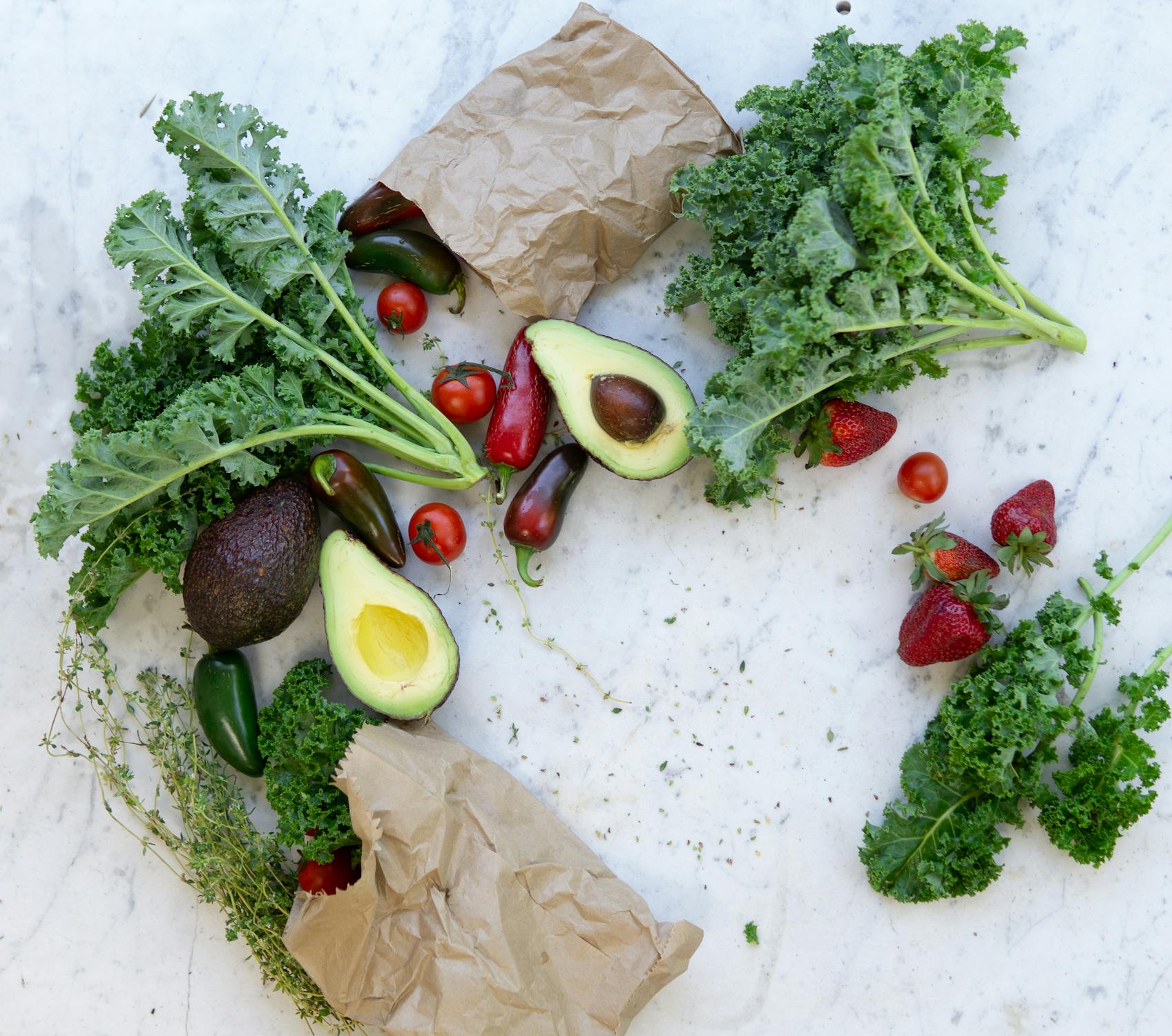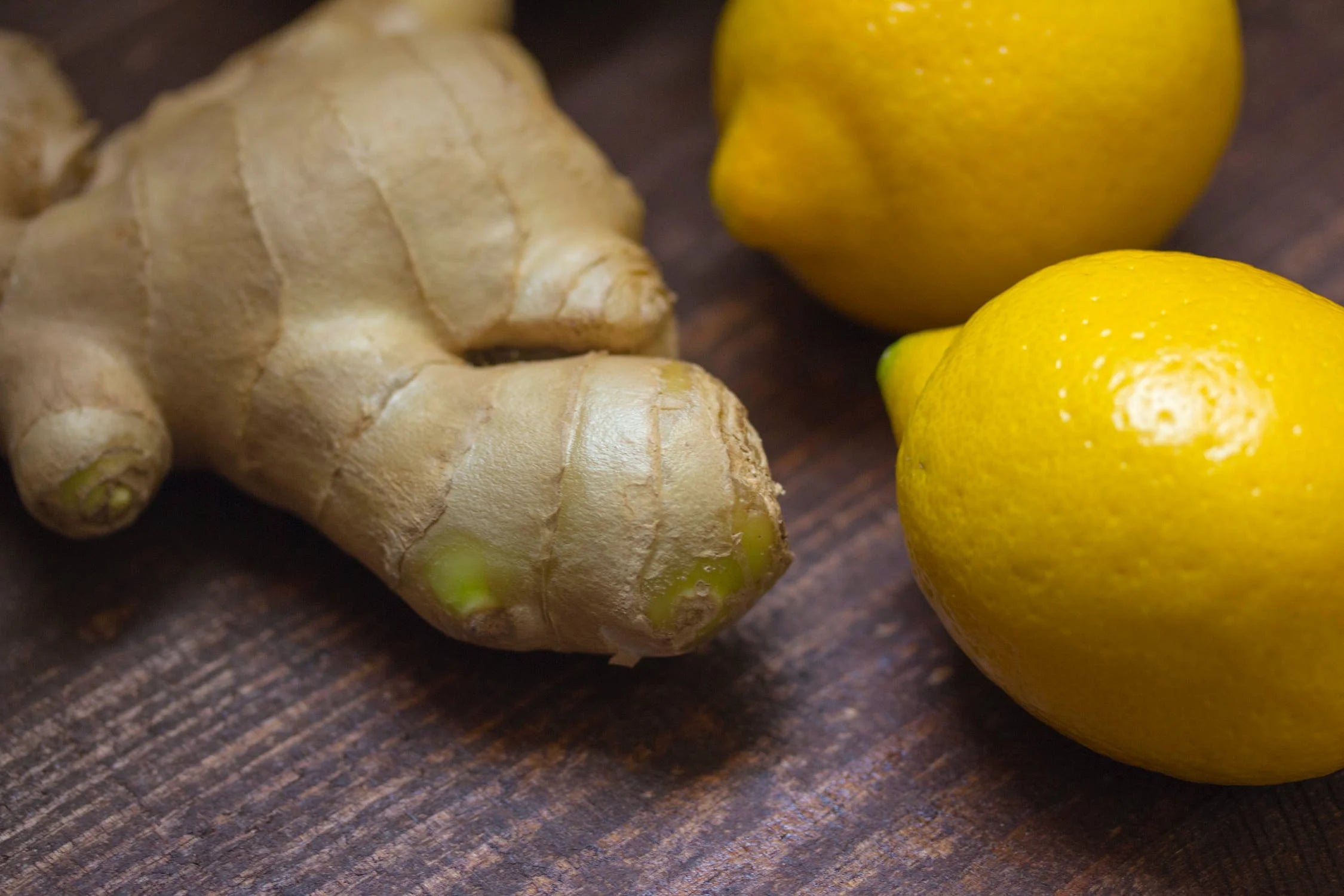Accessories
Check out our full lineup of yoga accessories to help you with your daily meditation practice and fitness goals...
Try our new Cork Yoga Brick for soft but solid support
Check out our full lineup of yoga accessories to help you with your daily meditation practice and fitness goals...
Reduce Bloating: How Superfoods Can Aid Digestive Comfort
February 28, 2024 9 min read

Bloating, a common digestive issue, affects many individuals worldwide. Characterised by a feeling of fullness, tightness, or swelling in the abdomen, bloating can be both uncomfortable and distressing. While it's often a result of overeating or consuming certain foods that the body finds hard to digest, bloating can also be a symptom of various underlying health conditions. It's a physical discomfort that can also impact one's self-esteem and quality of life.
In our quest for relief, the role of diet in managing and preventing bloating is paramount. This is where superfoods come into play. Superfoods, a term that has gained immense popularity in health and wellness circles, refers to foods that are rich in nutrients and antioxidants. These foods offer numerous health benefits, including improved digestion and the potential to alleviate bloating. Unlike regular foods, superfoods are packed with vitamins, minerals, fibre, and antioxidants, making them not just beneficial for overall health but specifically advantageous for digestive comfort.
The idea of using superfoods to combat bloating is rooted in their nutritional profile. High in fibre and essential nutrients, these foods can aid in better digestion, promote gut health, and help in the efficient processing of food. This, in turn, can lead to reduced feelings of bloating and discomfort. Moreover, the anti-inflammatory properties of many superfoods can soothe the digestive tract, further alleviating bloating symptoms.
This article aims to explore how incorporating superfoods into your diet can be a game-changer in your battle against bloating. We will delve into the causes of bloating, understand how diet impacts our digestive health, and highlight specific superfoods that can help in reducing bloating. Additionally, we will provide practical tips on incorporating these superfoods into your daily meals and discuss lifestyle changes that can enhance digestive comfort. By the end of this article, you will be equipped with knowledge and strategies to tackle bloating effectively, using nature's very own superfoods.
Understanding Bloating

Bloating is a prevalent digestive issue that manifests as an uncomfortable sensation of fullness or swelling in the abdomen. This condition can be both physically and emotionally distressing, often accompanied by symptoms such as abdominal discomfort, gas, and sometimes increased stomach girth.
Understanding the nuances of bloating is crucial for addressing it effectively. At its core, bloating is typically a result of excess gas production or disturbances in the movement of the muscles of the digestive system. This can lead to an accumulation of gas, fluid, or food in the stomach and intestines, causing the abdominal area to appear larger and feel uncomfortable or painful. Various factors contribute to bloating, ranging from dietary choices to lifestyle habits and medical conditions.
Diet plays a significant role in bloating. Consuming foods that are high in fat, overly processed, or those that the body finds difficult to digest can lead to increased gas production. Additionally, eating habits such as eating too quickly, not chewing food adequately, or overeating can exacerbate bloating symptoms. Certain foods like beans, lentils, wheat, and carbonated drinks are known to cause bloating in some individuals.
Lifestyle factors also influence bloating. Stress, for instance, can impact the digestive system and lead to bloating. Similarly, a sedentary lifestyle or lack of regular exercise can slow down the digestive process, contributing to this condition. Furthermore, medical conditions such as irritable bowel syndrome (IBS), lactose intolerance, and constipation can be underlying causes of bloating.
Understanding the causes of bloating is the first step towards managing it. It's important to note that while bloating is common, persistent or severe bloating should not be ignored, as it could be a sign of a more serious underlying health issue. By recognising the triggers and symptoms of bloating, individuals can take proactive steps towards alleviating this discomfort and improving their digestive health.
The Role of Diet in Digestive Health

The impact of diet on digestive health cannot be overstated. What we eat significantly influences our digestive system's functioning, affecting everything from the speed of digestion to the types of bacteria in our gut. A diet that promotes good digestive health can help prevent bloating and other gastrointestinal discomforts.
Firstly, the type of food we consume plays a critical role. Foods high in unhealthy fats, excessive spices, or sugar can slow down digestion, leading to a feeling of heaviness and bloating. On the other hand, a diet rich in fibre aids in regular bowel movements, which is crucial for preventing constipation and bloating. Fibre-rich foods, such as fruits, vegetables, and whole grains, help in the efficient movement of food through the digestive tract.
Another key aspect is the balance of gut bacteria. Our gut hosts a complex community of bacteria that plays a vital role in digestion, immune function, and even mental health. Consuming probiotic-rich foods like yoghourt, kefir, and fermented vegetables can help maintain a healthy balance of gut flora, which is essential for proper digestion and can alleviate symptoms of bloating.
Hydration also plays a pivotal role in digestive health. Water is essential for the digestion of food and the absorption of nutrients. Inadequate water intake can lead to dehydration, making the digestive system sluggish and increasing the risk of constipation and bloating. Therefore, it's important to drink sufficient water throughout the day.
Moreover, the manner in which we eat impacts our digestion. Eating slowly and chewing food thoroughly can significantly improve digestion and reduce bloating. It allows for better breakdown of food, making it easier for the digestive system to process it. Additionally, mindful eating helps in recognizing satiety cues, preventing overeating, which is a common cause of bloating.
A balanced diet rich in fibre, probiotics, and hydration, combined with mindful eating practices, can greatly enhance digestive health and reduce the likelihood of bloating.
Superfoods Explained

Superfoods, a term that has become increasingly popular in health and nutrition circles, refers to foods that are exceptionally nutrient-dense and beneficial for one's health. These foods are not only rich in vitamins and minerals but also packed with antioxidants, fibre, and various phytonutrients that contribute to overall well-being, including digestive health.
The defining characteristic of superfoods is their high concentration of essential nutrients. Unlike regular foods, superfoods contain higher levels of vitamins, minerals, and antioxidants. These nutrients are crucial for maintaining various bodily functions, including a healthy digestive system. For instance, the antioxidants present in superfoods can reduce inflammation in the body, including the digestive tract, thereby alleviating symptoms of bloating and discomfort.
Fibre is another key component of many superfoods. A diet high in fibre is essential for healthy digestion as it helps regulate bowel movements and prevent constipation, a common cause of bloating. Superfoods like chia seeds, quinoa, and berries are excellent sources of dietary fibre. They not only aid in digestion but also help in maintaining a feeling of fullness, which can prevent overeating and subsequent bloating.
Superfoods often contain beneficial enzymes and natural probiotics that support gut health. Foods such as yoghourt, kefir, and fermented vegetables introduce beneficial bacteria into the gut, promoting a healthy gut microbiome. This balance of good bacteria is vital for efficient digestion and can help mitigate issues like gas and bloating.
In addition to their direct benefits on the digestive system, superfoods also contribute to overall health, which indirectly supports digestive comfort. For example, the anti-inflammatory properties of superfoods can improve gut health, while their nutrient density can boost the immune system, further supporting the body's natural digestive processes.
Top Superfoods for Reducing Bloating

Incorporating certain superfoods into your diet can be a powerful way to combat bloating and enhance digestive comfort. These superfoods are not only nutrient-dense but also possess specific properties that aid in digestion and reduce inflammation. Here are some top superfoods that are particularly effective in reducing bloating:
- Ginger: Known for its anti-inflammatory properties, ginger can help in soothing the digestive tract and reducing bloating. It stimulates digestion and speeds up the movement of food from the stomach to the small intestine. Incorporating ginger into your diet can be as simple as adding it to your tea or using it as a spice in your meals.
- Yoghourt with Probiotics: Yoghourt is rich in probiotics, the good bacteria that are essential for gut health. These probiotics help balance the gut microbiome, which is crucial for proper digestion and can help reduce bloating and gas. Opt for natural, unsweetened yoghourt and consume it regularly for the best results.
- Bananas: High in potassium, bananas can help regulate fluid levels in the body and reduce salt-induced bloating. They are also rich in fibre, which aids in digestion and prevents constipation. Bananas are a versatile fruit that can be added to smoothies, cereal, or eaten as a snack.
- Quinoa: This gluten-free grain is not only high in protein but also rich in fibre, which is essential for bowel regularity and reducing bloating. Quinoa can be a great substitute for more traditional grains that might cause bloating in some individuals.
- Avocado: Avocados are high in potassium and fibre, both of which are beneficial for maintaining fluid balance and promoting healthy digestion. Their creamy texture and rich flavour make them a delicious addition to salads, sandwiches, or as a topping on toast.
- Chia Seeds: These tiny seeds are a powerhouse of fibre, which is key to preventing bloating. They also absorb water and expand in the stomach, helping to keep you full and preventing overeating. Chia seeds can be added to smoothies, yoghourt, or soaked overnight to make a pudding.
- Peppermint Tea: Peppermint has natural muscle-relaxing properties, which can be beneficial for relieving digestive issues like bloating and gas. Drinking peppermint tea can soothe the digestive tract and alleviate discomfort.
- Leafy Greens: Rich in fibre, vitamins, and minerals, leafy greens like spinach and kale can help improve digestion and prevent bloating. They are also low in calories and can be easily incorporated into a variety of dishes.
- Cucumbers: Due to their high water content and low fiber, cucumbers can help hydrate the body and reduce bloating. They are a refreshing addition to salads or can be enjoyed as a crunchy snack.
- Fennel: This vegetable has a natural diuretic effect, helping to reduce water retention and bloating. Fennel can be eaten raw, roasted, or added to salads.
Incorporating these superfoods into your diet can significantly reduce bloating and improve digestive health. Remember, it's important to introduce new foods gradually and pay attention to how your body reacts, as individual responses can vary.
Lifestyle and Dietary Tips for Enhancing Digestive Comfort

In addition to incorporating superfoods into your diet, certain lifestyle and dietary adjustments can further enhance digestive comfort and reduce bloating. Here are some practical tips:
- Stay Hydrated: Drinking adequate water is essential for digestion. It helps break down food, allowing nutrients to be absorbed and waste to be moved smoothly through the digestive system. Aim for at least 8 glasses of water a day.
- Regular Exercise: Physical activity stimulates the muscles of the digestive system, helping to move food through the gut more efficiently. Even a daily walk can make a significant difference.
- Mindful Eating: Eat slowly and chew your food thoroughly. This not only aids in digestion but also helps in preventing overeating, which is a common cause of bloating.
- Manage Stress: High stress levels can negatively impact your digestive system. Techniques such as deep breathing, yoga, or meditation can help manage stress and improve digestion.
- Meal Planning: Eating smaller, more frequent meals can be easier on your digestive system than consuming large meals. Plan your meals to include a balance of carbohydrates, proteins, and healthy fats.
- Avoid Trigger Foods: Identify and avoid foods that trigger your bloating. Common culprits include carbonated drinks, artificial sweeteners, and high-fat foods.
By combining these lifestyle and dietary tips with a diet rich in superfoods, you can significantly enhance your digestive health and reduce the discomfort of bloating.
Conclusion: How Superfoods Can Aid Digestive Comfort
Bloating can be effectively managed and reduced through a careful selection of diet and lifestyle choices. Superfoods, with their rich nutrient profiles and digestive benefits, play a significant role in enhancing digestive comfort. By incorporating a variety of these superfoods into your diet and adhering to key lifestyle practices like staying hydrated, exercising regularly, and eating mindfully, you can significantly alleviate bloating and improve your overall digestive health. Remember, individual responses vary, so it's important to listen to your body and adjust your diet accordingly. Embrace these changes as part of a holistic approach to a healthier, more comfortable digestive system.
Discover the power of superfoods with Lean Greens, offering a range of products designed to support your weight loss and wellness journey.
Further Reading
For those interested in delving deeper into the topics of superfoods, digestive health, and overall wellness, the following resources offer valuable information and insights:
- "Gut: The Inside Story of Our Body's Most Underrated Organ" by Giulia Enders - A fascinating exploration of the human digestive system and its significant impact on our health and well-being.
- "The Bloated Belly Whisperer: See Results Within a Week and Tame Digestive Distress Once and for All" by Tamara Duker Freuman - This book offers practical advice for those struggling with digestive discomfort and bloating.
- Harvard Health Blog - The Harvard Health Blog provides articles and insights from medical professionals on various health topics, including nutrition and digestive health.

Reduce Bloating: How Superfoods Can Aid Digestive Comfort
February 28, 2024 9 min read
Bloating, a common digestive issue, affects many individuals worldwide. Characterised by a feeling of fullness, tightness, or swelling in the abdomen, bloating can be both uncomfortable and distressing. While it's often a result of overeating or consuming certain foods that the body finds hard to digest, bloating can also be a symptom of various underlying health conditions. It's a physical discomfort that can also impact one's self-esteem and quality of life.
Read More

Green Smoothie Recipes: Incorporating Superfoods for a Health Boost
February 21, 2024 10 min read
Green smoothies are more than just a health trend; they are a powerful way to enhance your daily nutrition and overall well-being. At the heart of these vibrant drinks are leafy greens – packed with essential vitamins, minerals, and fibre – blended into a convenient and delicious form. But what elevates a green smoothie from merely nutritious to a powerhouse of health? The answer lies in the incorporation of superfoods.
Read More

Discover the Benefits of Adding Green Drink Smoothies to Your Daily Routine
February 17, 2024 7 min read
Discover the benefits of adding green drink smoothies to your daily routine. Enhance your health and well-being with nutrient-rich beverages that improve digestion, boost energy levels, and support weight management. Start your journey to better health with Lean Greens today.
Read More